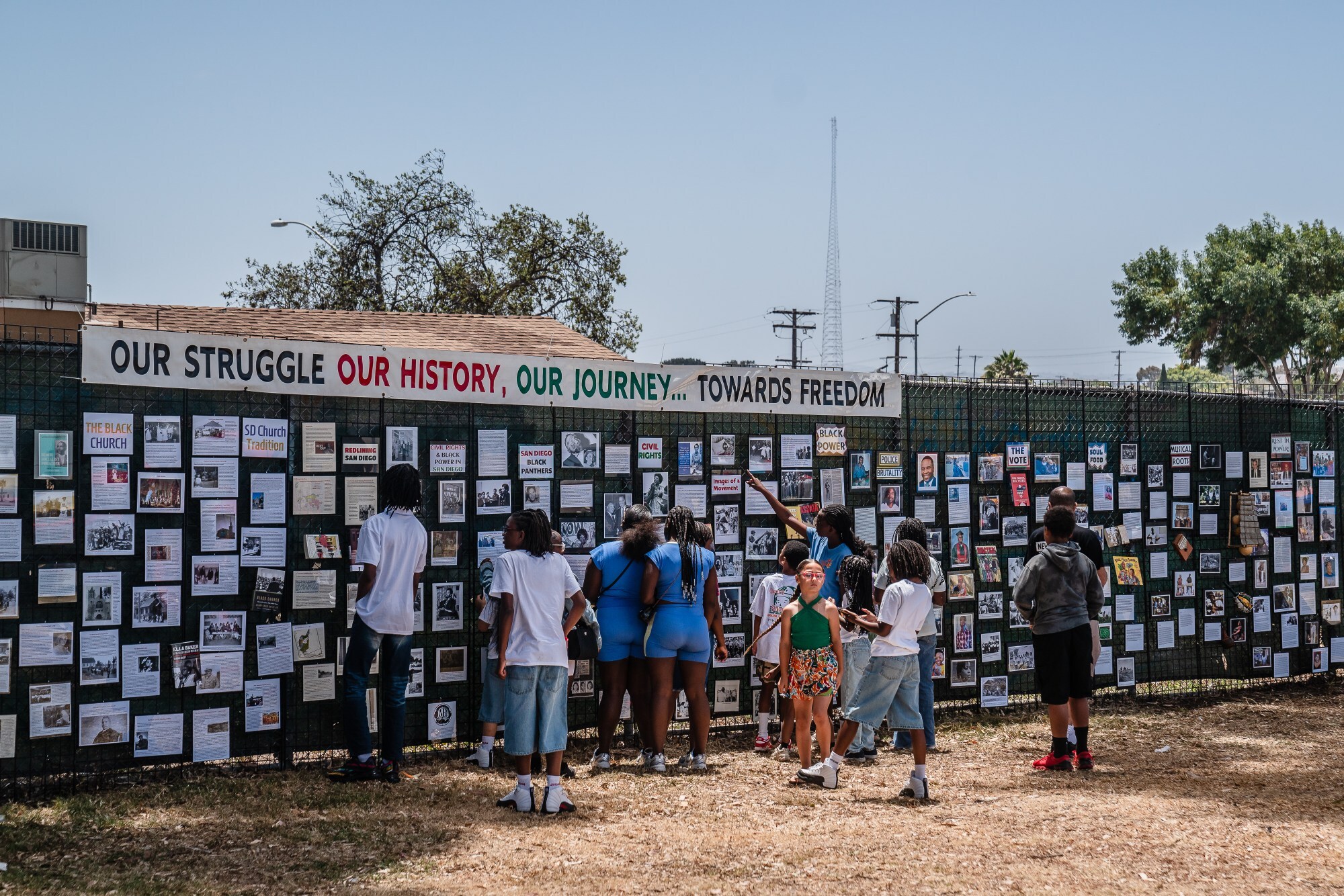San Diegans Mark Juneteenth with Music, History, and Community Spirit

In the face of federal funding cuts, a scaled-back celebration still brought San Diegans together to celebrate Juneteenth, honoring the day with music, history and community.
The annual, free event, held at Memorial Park in Logan Heights, celebrates Black history and the Juneteenth holiday, which commemorates the end of slavery in the U.S. after nearly 250 years.
But this year, grant funding from the National Endowment for the Arts to support the event was terminated — part of the Trump administration’s widespread funding cuts across federal agencies — and it left event organizers to budget available resources.
Saturday’s celebration was organized by the Cooper Family Foundation, whose founder — former San Diego resident Sidney Cooper Sr. — began the event about 50 years ago as a way to unite southeastern San Diego and help educate the community about Black history.
“He came (to San Diego) with the knowledge already of Juneteenth,” said Maliya Jones, Cooper’s granddaughter and the foundation’s marketing and events coordinator.
Cooper first held picnics and small gatherings to celebrate the day, but ultimately expanded the celebration because “everybody needs to know what Juneteenth is,” Jones added.
Today, that legacy continues on. The event features a history wall, where attendees can learn about the Black community from its origins in Africa, to slavery and racism in the U.S., to the community’s modern day struggles and their power through joy.
There are also musical performances by gospel singers and African drummers and community groups with booths, including free health services, and local vendors.
But this year’s celebration was somewhat scaled back, Jones says. The Cooper Family Foundation lost a $25,000 grant earlier this year from the National Endowment for the Arts, as part of the agency’s updated focus on “projects that reflect the nation’s rich artistic heritage and creativity as prioritized by the President,” according to an email sent to grantees.
While the foundation had enough funding to hold this year’s event, Jones said they had to set aside some of the money in case they need it for next year, with funding for 2026 now uncertain.
The grant termination came just months after the Trump administration took steps to remove references to Black Americans’ work and achievements from federal websites and institutions.
“Our culture and history is a part of American history, and it’s something that can’t be erased,” Jones said. “But even with everything that’s going on, we’re still finding strength and joy, as my ancestors did, to continue this celebration.”
In 1863, the Emancipation Proclamation — signed by President Abraham Lincoln during the Civil War — declared freedom for enslaved people in Confederate states. But since some states were still under Confederate control, it took years for all enslaved people to actually be free.
Juneteenth honors June 19, 1865 — the day that Union troops arrived in Galveston, Texas, and announced freedom for thousands of enslaved Black people.
Later that year, the 13th Amendment to the Constitution formally abolished slavery and involuntary servitude, except as a punishment for a crime.
“Juneteenth marks our country’s second independence day,” according to the National Museum of African American History and Culture.
Saturday’s event at Memorial Park was a celebration of that independence, with families and friends sprawled on the grass on blankets and folding chairs, enjoying the music and the sunny day.
For Charlene Lambert, who has been attending the event for years, it’s a great way to connect and reconnect with friends, even those from elementary and high school. And as if speaking it into existence, while Lambert sat on the grass, two friends came up to say hello and give her a hug.
Lambert attended middle school in Logan Heights — just as her parents did before her — and says she values the multigenerational community connection. She brings her 13-year-old granddaughter to Juneteenth “to let her know that we can stand together.”
Elements of the celebration were aimed at the younger generations. By participating in a scavenger hunt at the event’s history wall, children earned access to the event’s fun zone for kids.
But the lessons in history and culture were for all ages, and the history wall featured not only a historical timeline but information about the food and musical roots of the Black community.
“It’s history that’s easy to access for the community,” said Dawn Miller, one of the event volunteers and a high school ethnic studies teacher.
Pamela Daniels, a lifelong San Diegan, says she wants to see Juneteenth as a more consistent part of school curriculums, so that people can learn and begin to understand it at a younger age.
She and her family have been celebrating Juneteenth her whole life and coming together to talk about the history, she said while sitting in the shade of the park’s trees on Saturday.
And to her, the federal efforts to diminish references to Black history and culture make her more encouraged to continue those discussions.
“Let’s spread this news around and talk about it even more,” she said.
©2025 The San Diego Union-Tribune. Visit sandiegouniontribune.com. Distributed by Tribune Content Agency, LLC.
Post a Comment for "San Diegans Mark Juneteenth with Music, History, and Community Spirit"
Post a Comment